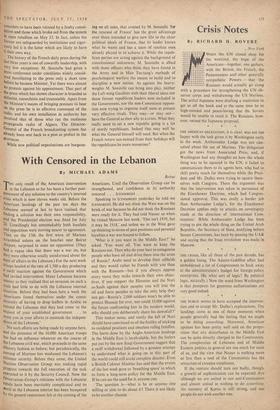Crisis Notes
By RICHARD H. ROVERE New York
WHEN the UN closed shop for - the weekend, the hope of the
* *
THE AMERICAN DELEGATION, it is clear, was not too happy with the task given it by Washington early in the week. Ambassador Lodge was not con- sulted about the use of Marines. The delegation got the news from Associated Press, and, if Washington had any thoughts on how the whole thing was to be squared in the UN, it failed to communicate them to its agents here, who had to shift pretty much for themselves while the Presi- dent and Mr. Dulles were trying to square them- selves with Congress. There the argument was that the intervention was taken in pursuance of the Eisenhower Doctrine, which had Congres- sional approval. This was really a harder job than Ambassador Lodge's, for the Eisenhower Doctrine applies only to attacks on sovereignty made at the direction of 'international Com- munism.' While Ambassador Lodge has been trying to pin the whole thing on the United Arab Republic, the Secretary of State, testifying before Senate Committees, has been by-passing the UAR and saying that the Iraqi revolution was made in Moscow.
* * *
THE CRISIS, like all those of the past decade, has a golden lining. The Adams-Goldfine affair had emboldened a lot of Congressmen to hack away at the administration's budget for foreign-policy enterprises. (By what sort of logic? By political logic, naturally.) Now the word from Washington is that prospects for generous authorisations are very good indeed.
* * *
THE PUBLIC seems to have accepted the interven- tion and to accept Mr. Dulles's explanations. The landings came at one of those moments when people generally had the feeling that we ought to be doing something. Moreover, American opinion has been pretty well sold on the propo- sition that any disturbance in the Middle East can be quite directly charged to the Communists. The complexities of Lebanese and of Middle Eastern politics in general are too much for most of us, and the view that Nasser is nothing more or less than a tool of the Communists has the attraction of extreme simpleness.
If the venture should turn out badly, though, a growth of sophistication can be expected. For although we are united in our anti-Communism and almost united in wishing to do something, the memory of. Korea is still strong, and our people do not wish another one.


































 Previous page
Previous page